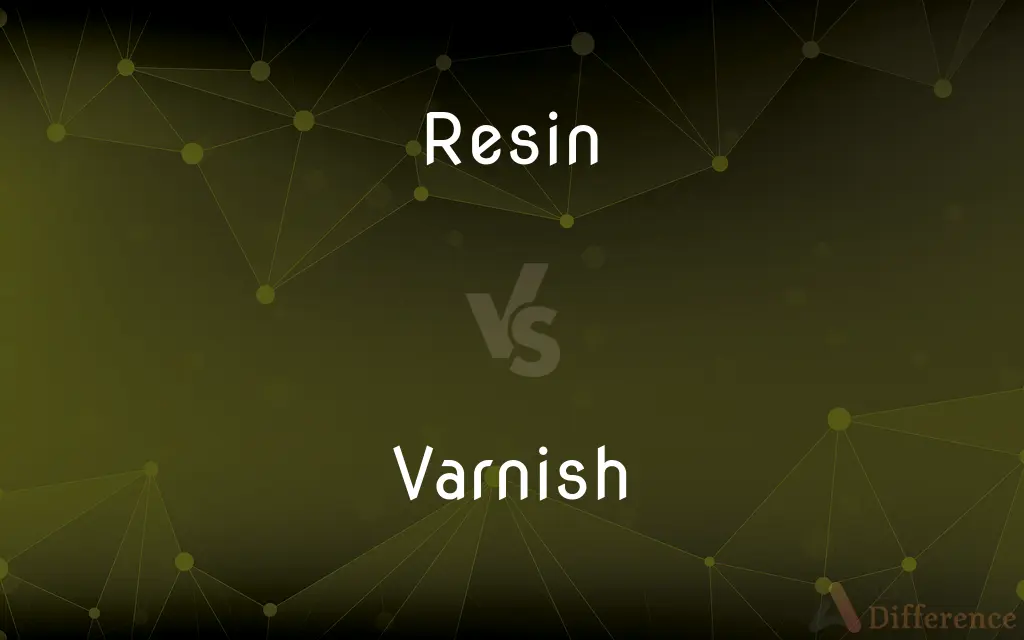Resin vs. Varnish — What's the Difference?

Difference Between Resin and Varnish
ADVERTISEMENT
Compare with Definitions
Resin
In polymer chemistry and materials science, resin is a solid or highly viscous substance of plant or synthetic origin that is typically convertible into polymers. Resins are usually mixtures of organic compounds.
Varnish
Varnish is a clear transparent hard protective coating or film. It is not a stain.
Resin
A sticky flammable organic substance, insoluble in water, exuded by some trees and other plants (notably fir and pine)
Clear resin had oozed to the surface, trickled down, and set
Varnish
Resin dissolved in a liquid for applying on wood, metal, or other materials to form a hard, clear, shiny surface when dry
The wood was stained with a dark varnish
Several coats of varnish
Resin
A solid or liquid synthetic organic polymer used as the basis of plastics, adhesives, varnishes, or other products
Epoxy resins frequently cause dermatitis
The chassis is constructed of synthetic resin
ADVERTISEMENT
Varnish
Apply varnish to
We stripped the floor and varnished it
Her toenails were varnished red
Resin
Rub or treat with resin
Resined canvas
Varnish
A liquid that contains a solvent and an oxidizing or evaporating binder and is applied to a surface to produce a hard, transparent finish after evaporation and curing.
Resin
Any of numerous clear to translucent yellow or brown, solid or semisolid, viscous substances of plant origin, such as copal, rosin, and amber, used principally in lacquers, varnishes, inks, adhesives, plastics, and pharmaceuticals. Resins are usually insoluble in water.
Varnish
The smooth coating or gloss resulting from the application of this liquid
Wear dulled the floor's varnish.
Resin
Any of numerous physically similar polymerized synthetics or chemically modified natural resins including thermoplastic materials such as polyvinyl, polystyrene, and polyethylene and thermosetting materials such as polyesters, epoxies, and silicones that are used with fillers, stabilizers, pigments, and other components to form plastics.
Varnish
Something suggestive of or resembling varnish.
Resin
To treat or rub with resin.
Varnish
An often deceptive external appearance or outward show
"people through whom a native stupidity shines forth past any varnish of education or acculturation" (Ira Sher).
Resin
A viscous hydrocarbon secretion of many plants, particularly coniferous trees.
Varnish
To cover with varnish.
Resin
Any of various yellowish viscous liquids or soft solids of plant origin; used in lacquers, varnishes and many other applications; chemically they are mostly hydrocarbons, often polycyclic.
Varnish
To give a smooth and glossy finish to.
Resin
Any synthetic compound of similar properties.
Varnish
To give a superficial or deceptive appearance to
Varnish the truth.
Resin
(transitive) To apply resin to.
Varnish
A type of paint with a solvent that evaporates to leave a hard, transparent, glossy film.
Resin
Any one of a class of yellowish brown solid inflammable substances, of vegetable origin, which are nonconductors of electricity, have a vitreous fracture, and are soluble in ether, alcohol, and essential oils, but not in water; specif., pine resin (see Rosin).
Varnish
Anything resembling such a paint; glossy appearance.
Resin
Any of various polymeric substance resembling the natural resins[1], prepared synthetically; - they are used, especially in particulate form, in research and industry for their property of specifically absorbing or adsorbing substances of particular types; they are especially useful in separation processes such as chromatography; as, an ion-exchange resin.
Varnish
(by extension) A deceptively showy appearance.
Resin
Any of a class of solid or semisolid viscous substances obtained either as exudations from certain plants or prepared by polymerization of simple molecules
Varnish
A passenger train, probably derived from the varnished passenger cars used at one time.
Varnish
(intransitive) To apply varnish.
Varnish
(transitive) To cover up with varnish.
Varnish
(transitive) To make something superficially or deceptively attractive
Varnish the report
Varnish
(transitive) To gloss over a defect.
Varnish
A viscid liquid, consisting of a solution of resinous matter in an oil or a volatile liquid, laid on work with a brush, or otherwise. When applied the varnish soon dries, either by evaporation or chemical action, and the resinous part forms thus a smooth, hard surface, with a beautiful gloss, capable of resisting, to a greater or less degree, the influences of air and moisture.
Varnish
That which resembles varnish, either naturally or artificially; a glossy appearance.
The varnish of the holly and ivy.
Varnish
An artificial covering to give a fair appearance to any act or conduct; outside show; gloss.
And set a double varnish on the fameThe Frenchman gave you.
Varnish
To lay varnish on; to cover with a liquid which produces, when dry, a hard, glossy surface; as, to varnish a table; to varnish a painting.
Varnish
To cover or conceal with something that gives a fair appearance; to give a fair coloring to by words; to gloss over; to palliate; as, to varnish guilt.
Close ambition, varnished o'er with zeal.
Cato's voice was ne'er employedTo clear the guilty and to varnish crimes.
Varnish
Paint that provides a hard glossy transparent coating
Varnish
Cover with varnish
Share Your Discovery

Previous Comparison
Wireframe vs. Storyboard
Next Comparison
Kilometre vs. Kilometer













































